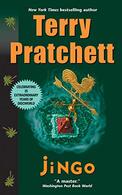
| Series: | Discworld #21 |
| Publisher: | Harper |
| Copyright: | 1997 |
| Printing: | May 2014 |
| ISBN: | 0-06-228020-1 |
| Format: | Mass market |
| Pages: | 455 |
This is the 21st Discworld novel and relies on the previous Watch novels for characterization and cast development. I would not start here.
In the middle of the Circle Sea, the body of water between Ankh-Morpork and the desert empire of Klatch, a territorial squabble between one fishing family from Ankh-Morpork and one from Klatch is interrupted by a weathercock rising dramatically from the sea. When the weathercock is shortly followed by the city to which it is attached and the island on which that city is resting, it's justification for more than a fishing squabble. It's a good reason for a war over new territory.
The start of hostilities is an assassination attempt on a prince of Klatch. Vimes and the Watch start investigating, but politics outraces police work. Wars are a matter for the nobility and their armies, not for normal civilian leadership. Lord Vetinari resigns, leaving the city under the command of Lord Rust, who is eager for a glorious military victory against their long-term rivals. The Klatchians seem equally eager to oblige.
One of the useful properties of a long series is that you build up a cast of characters you can throw at a plot, and if you can assume the reader has read enough of the previous books, you don't have to spend a lot of time on establishing characterization and can get straight to the story. Pratchett uses that here. You could read this cold, I suppose, because most of the Watch are obvious enough types that the bits of characterization they get are enough, but it works best with the nuance and layers of the previous books. Of course Colon is the most susceptible to the jingoism that prompts the book's title, and of course Angua's abilities make her the best detective. The familiar characters let Pratchett dive right in to the political machinations.
Everyone plays to type here: Vetinari is deftly maneuvering everyone into place to make the situation work out the way he wants, Vimes is stubborn and ethical and needs Vetinari to push him in the right direction, and Carrot is sensible and effortlessly charismatic. Colon and Nobby are, as usual, comic relief of a sort, spending much of the book with Vetinari while not understanding what he's up to. But Nobby gets an interesting bit of characterization in the form of an extended turn as a spy that starts as cross-dressing and becomes an understated sort of gender exploration hidden behind humor that's less mocking than one might expect. Pratchett has been slowly playing more with gender in this series, and while it's simple and a bit deemphasized, I like it.
I think the best part of this book, thematically, is the contrast between Carrot's and Vimes's reactions to the war. Carrot is a paragon of a certain type of ethics in Watch novels, but a war is one of the things that plays to his weaknesses. Carrot follows rules, and wars have rules of a type. You can potentially draw Carrot into them. But Vimes, despite being someone who enforces rules professionally, is deeply suspicious of them, which makes him harder to fool. Pratchett uses one of the Klatchian characters to hold a mirror up to Vimes in ways that are minor spoilers, but that I quite liked.
The argument of jingoism, made by both Lord Rust and by the Klatchian prince, is that wars are something special, outside the normal rules of justice. Vimes absolutely refuses this position. As someone from the US, his reaction to Lord Rust's attempted militarization of the Watch was one of the best moments of the book.
Not a muscle moved on Rust's face. There was a clink as Vimes's badge was set neatly on the table.
"I don't have to take this," Vimes said calmly.
"Oh, so you'd rather be a civilian, would you?"
"A watchman is a civilian, you inbred streak of pus!"
Vimes is also willing to think of a war as a possible crime, which may not be as effective as Vetinari's tricky scheming but which is very emotionally satisfying.
As with most Pratchett books, the moral underpinnings of the story aren't that elaborate: people are people despite cultural differences, wars are bad, and people are too ready to believe the worst of their neighbors. The story arc is not going to provide great insights into human character that the reader did not already have. But watching Vimes stubbornly attempt to do the right thing regardless of the rule book is wholly satisfying, and watching Vetinari at work is equally, if differently, enjoyable.
Not the best Discworld novel, but one of the better ones.
Followed by The Last Continent in publication order, and by The Fifth Elephant thematically.
Reviewed: 2022-10-02